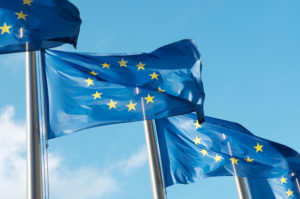Highlights from the Past Week
CW 37 / Monday, 12 to Thursday, 15 September: Plenary Sessions Week (Strasbourg);
CYBER RESILIENCE ACT – COMMISSION PRESENTS PROPOSAL: The European Commission presented the proposal for the Cyber Resilience Act (CRA, COM(2022) 454) on Thursday. This contains:
- Rules for the placing on the market of products with digital elements to ensure their cybersecurity;
- Essential requirements for the design, development and production of products with digital elements, and obligations for economic operators in relation to these products;
- Essential requirements for the vulnerability handling processes put in place by manufacturers to ensure the cybersecurity of products with digital elements during the whole life cycle, and obligations for economic operators in relation to those proce Manufacturers must also report actively exploited vulnerabilities and incidents;
- Market surveillance and enforcement of the
The new Cyber Resilience Act will complement the EU framework for cybersecurity: the Directive on security of network and information systems (the NIS Directive), the Directive on measures for a high common level of cybersecurity across the Union (NIS2 Directive), and the EU Cybersecurity Act.
On the European Commission’s website you will find the text of the Regulation, the factsheet, the FAQs and the press release.
MEDIA FREEDOM ACT – COMMISSION ADOPTS LEGISLATIVE PROPOSAL: Last Friday, the Commission adopted its proposal for a European Media Freedom Act (COM(2022) 457).
The Commission’s proposal is divided into four fields:
- Fostering cross-border activity and investment in media services by harmonising national frameworks;
- Increasing regulatory cooperation and convergence through cross-border coordination tools and EU-level opinions and guidelines;
- Mitigating the risk of undue public and private interference in editorial freedom so that journalists can work without interference and their sources and communications remain protected; and
- Ensuring transparent and fair allocation of economic resources in the internal media market by enhancing transparency and fairness in audience measurement and allocation of state advertising.
On the European Commission’s website you will find the text of the regulation, the factsheet, the FAQs and the press release.
Part of what the text takes up is a call from the media industry that was rejected in the Digital Services Act: Special treatment for content of media service providers on online platforms.
CSAM I – EP RAPPORTEUR APPOINTED: Last week, the European Parliament submitted the Regulation laying down rules to prevent and combat child sexual abuse (CSAM Regulation) to the Committee on Civil Liberties (LIBE). The Committees on Culture, on Women’s Rights & Gender Equality and on Budgets will deliver an opinion. Committee Chair A. Cavazzini informed Politico Pro (paywall) that the Internal Market Committee is seeking joint competence.
The rapporteur position has been assigned to EPP MEP J. Zarzalejos (ES). The shadow rapporteur for Renew will be H. Vautmans (BE) and for the Greens P. Breyer (DE). The opinion for the Culture Committee will be drafted by N. Kizilyürek (GUE, CY). In the Internal Market Committee, the role goes to Alex Agius Saliba (S&D, MT).
CSAM II – POSITIONS OF MEMBER STATES AND FIRST COMPROMISE: Last week, Netzpolitik.org (DE) published an item about the meeting of the Council Law Enforcement Working Party from 20 July. The item presents an opinion on the Commission’s proposal on the CSAM Regulation. In particular, the information notes that not even one single Member State has endorsed the so-called “chat control”.
Meanwhile, the Czech Presidency has also presented the first compromise (PDF), which is to be discussed in the Council Working Party on 22 September.
As also stated in the item, national authorities should be able to oblige search engines to delist a website “regarding certain content of sexual abuse of minors”. These orders would be legally contestable. The Council Presidency also proposes to add more details about the targeted user when reporting content. This version extends the possibility for a national authority to require ISPs to block all content of sexual abuse of minors, not only the content already identified. Any order must be forwarded to the coordinating authority. (see Contexte, FR, paywall)
DATA ACT – COUNCIL PRESIDENCY WITH NEW COMPROMISE PROPOSAL: Last week, the Council addressed the Czech Presidency’s latest compromise proposal (PDF) on the Data Act and Chapters VI to XI.
The first amendments concern the switching between data processing services (Articles 23 to 26). In this point, Prague proposes in particular to oblige data processing service providers to offer an open API for data extraction, which is no longer publicly accessible but “equally available” to clients and their new provider. The Presidency also clarified the provisions on possible infringements of the Regulation as well as the various tasks of the competent authorities, and introduced an article detailing the role of the future European Data Innovation Board (Article 34a) in relation to the Data Act.
Another issue was the possible limitation of the sui generis right (Article 35). The Commission had proposed that this right should not apply to data “obtained from or generated by the use of a product or a related service”. (see Contexte, FR, paywall and Euractiv)
ARTIFICIAL INTELLIGENCE – NEW COUNCIL PROPOSAL: Politico Pro (paywall) reports on the Czech Presidency’s latest compromise proposal on AI, which will be discussed in the Council Working Party on Thursday.
The text mainly contains clarifications and fine-tuning on some of the positions that were included in the second compromise. Among the most important points are:
- Reaffirming that AI systems used in high-risk scenarios, but whose use is “purely accessory” to an AI-driven decision, are not themselves considered high-risk;
- The compromise contains further definitions and explains what the term “user” means in the context of the AI Act. The text also removes “human-defined” objectives as a defining characteristic of AI;
- AI-focused research and development activities, including research for military or national security purposes, are now explicitly excluded from the scope of the AI Act;
- Other changes relate to AI tools in the financial sector, which would make it easier for the industry to integrate AI compliance into existing supervisory procedures.
AI LIABILITY – REBUTTABLE PRESUMPTION FOR AI-RELATED DAMAGES: Euractiv has had a first glance at a leak of the the AI Liability Directive, scheduled to be published on 28 September.
“This directive provides in a very targeted and proportionate manner alleviations of the burden of proof through the use of disclosure and rebuttable presumptions,” the draft reads. “These measures will help persons seeking compensation for damage caused by AI systems to handle their burden of proof so that justified liability claims can be successful,” Euractiv goes on to report. (see also Politico Pro, paywall)
DIGITAL SERVICES ACT – SECOND ROUND PASSED IN EP: Last Monday, the European Parliament’s Internal Market Committee (IMCO) adopted the Digital Services Act (DSA) in a corrected version (PDF) following a legal and linguistic analysis.
The regulation is expected to be available for the meeting of Member States’ representatives in the Council (Coreper I) on 28 September. The final ministerial endorsement is scheduled for the Ecofin Council on 4 October.
DIGITAL MARKETS ACT – OFFICIALLY SIGNED: The Digital Markets Act (DMA) was signed by the Czech Minister for European Affairs, Mikuláš Bek, and the President of the European Parliament, Roberta Metsola (EPP), during the plenary session week in Strasbourg. It can thus enter into force in the near future after publication in the EU’s Official Journal, which is still pending.
ARTIFICIAL INTELLIGENCE – CONSOLIDATED VERSION OF JURI OPINION: The Parliament’s Legal Affairs Committee (JURI) has published the consolidated version (PDF) of its opinion on the AI Act. The JURI Committee has exclusive competence for the provisions on transparency (Art. 13 and 52), human oversight (Art. 14) and codes of conduct (Art. 69).
DIGITAL TAX / GLOBAL MINIMUM TAX – EU FINANCE MINISTERS WANT IMPLEMENTATION, EVEN WITHOUT HUNGARY: During the informal meeting of EU finance ministers in Prague the week before last, the finance ministers of France, Germany, Italy, Spain and the Netherlands announced their intention to push ahead with the implementation of the global minimum corporate tax. They want to undermine the Hungarian blockade of the EU directive that was intended to implement the international tax treaty.
Relevant Publications, including from the EP Think Tank:
- State of the Union address, European Parliament, 2022 (Briefing)
- Digitalisation and changes in the world of work (Study)
- Plenary round-up – September 2022 (At a Glance)
Outlook for the Current Week
You can find a list of the upcoming dates of the European Parliament here. The meeting calendar for 2022 can be found here (PDF).
An overview of the most important dates of the Council week can be found here and the meeting calendar can be accessed here. You can access the official calendar of the Czech Presidency here (PDF).
Included among these dates are:
Summits and Ministerial Meetings:
- General Affairs Council, Tuesday, 20 September – Agenda, A Items, Addition 1;
Preparatory Bodies:
- Working Party on Hybrid Threats, Monday, 19 September;
- Working Party on Competitiveness and Growth (Industry) (incl. Chips Act), Monday, 19 September and Thursday, 22 September;
- Working Party on Competitiveness and Growth (Internet Market) (incl. Ecodesign, SMEI), Tuesday, 20 September;
- Working Party on Tax Questions (High Level) (incl. global minimal level of taxation), Tuesday, 20 September;
- Horizontal Working Party on Cyber Issues, Tuesday, 20 September;
- Law Enforcement Working Party (Police) (incl. CSAM), Thursday, 22 September;
- Working Party on Telecommunications and Information Society (incl. AI), Thursday, 22 September;
- Working Party on Judicial Cooperation in Criminal Matters (COPEN), Friday, 23 September;
- COREPER I, Wednesday, 21 and Friday, 23 September;
- COREPER II, Wednesday, 21 September;
Information on the weekly Commission Meeting can be found in the preview (PDF) or (at short notice) in the current agenda.
The following topics are on the agenda for the coming week:
- Revision of the firearms Regulation
- Recommendation on cancer screening
You can find the judicial calendar of the ECJ here. Several dates in September are dedicated to the GDPR (see GDPR Beetle):
- On Tuesday, the rulings will be delivered on the Spacenet data retention case (C-793/19 & C-794/19) and VD & SR (C 339/20 & C-397/20), and the Attorney General will deliver an opinion on whether the GDPR prevents the German competition authority from assessing whether Meta’s data processing is compatible with the GDPR (C-252/21).
- Thursday will see another opinion of the Advocate General on Article 88 of the GDPR, which deals with the question of whether the national law protecting the processing of personal data is applicable if the law does not meet the requirements of Article 88 (C-34/21).
European Parliament Committees
CW 38 / Monday, 19 to Friday, 23 September: Green Week (no meetings);
LIBE Committee (Civil Liberties)
Current Meetings
- None
Further Meetings (Calendar)
- Monday, 10 October 2022, 15.00-18.30 (Brussels)
- Tuesday, 25 October 2022, 14.30-18.30 (Brussels)
JURI Committee (Legal Affairs)
Current Meetings
- None
Further Meetings (Calendar)
- Monday, 3 October 2022
Dossiers Timetable (2 September 2022)
ITRE Committee (Industry)
Current Meetings
- None
Further Meetings (Calendar)
- Monday, 26 September 2022, 15.00-18.30 (Brussels)
Dossiers Timetable (13 September 2022)
IMCO Committee (Internal Market)
Current Meetings
- None
Further Meetings (Calendar)
- Monday, 10 October 2022, 15.00-18.30 (Brussels)
Dossiers Timetable (September 2022)
CULT Committee (Culture)
Current Meetings
- None
Further Meetings (Calendar)
- Monday, 3 October 2022 (Strasbourg)
PEGA Committee (Pegasus Committee of Inquiry)
Current Meetings
- None
Further Meetings
- Open
INGE2 Committee (Special Committee on Foreign Interference)
Current Meetings
- None
Further Meetings (Calendar)
- Thursday, 29 September 2022, 9.00-12.30 (Brussels)
Further Parliamentary Calendar Dates
- CW 39 / Monday, 26 to Thursday, 29 September: Political Group and Committee Meetings Week (Brussels);
- CW 40 / Monday, 3 to Thursday, 6 October: Plenary Sessions Week (Strasbourg);
- CW 41 / Monday, 10 to Thursday, 13 October: Political Group and Committee Meetings Week (Brussels);




